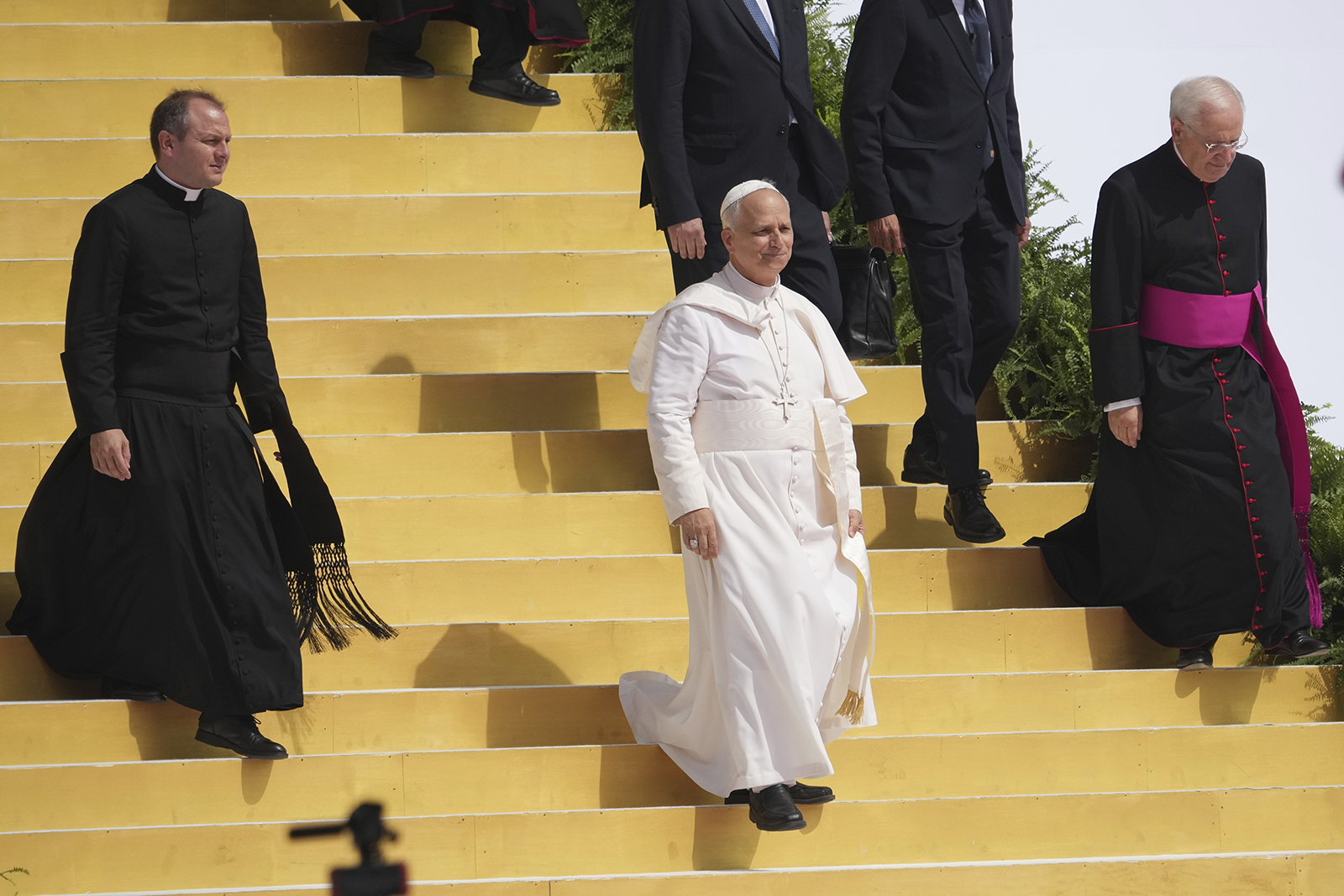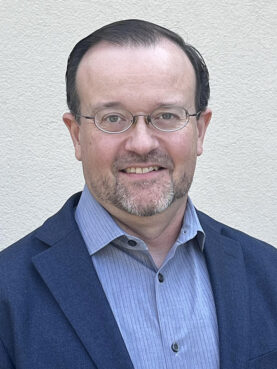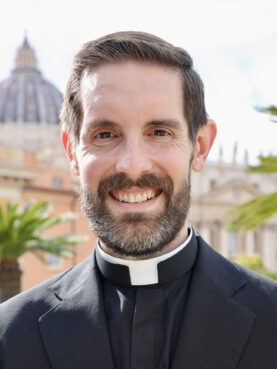
VATICAN CITY (RNS) — From the start of his pontificate, Pope Leo XIV signaled his interest — and concern — over the rapid development of Artificial Intelligence, prompting many Vatican observers to believe a major papal document might be coming to address autonomous systems and their impact on humanity.
The Vatican has been carefully observing the rise of AI, which has made dramatic leaps just this year. The new version of ChatGPT, released by OpenAI in February, claims improved emotional understanding, and Google’s AlphaEvolve is creatively solving mathematical problems. Google’s Veo 3 creates state-of-the-art AI videos with synched audio. AI-controlled F-16s are now rivaling human pilots, and China is deploying intelligent robots to do an increasing number of tasks, from waiting tables to providing health care. Experts say Artificial General Intelligence — machines capable of simulating human reasoning — may be only a few years away.
A mathematician, canon lawyer and theologian, Pope Leo has shown he understands the stakes. Speaking to cardinals in the Sistine Chapel only 48 hours after his election, he said he was inspired to take the name Leo to follow in the footsteps of Leo XIII, who in 1891 issued “Rerum Novarum” (“On Revolutions”) to address the upheavals of the Industrial Revolution.
“In our own day, the church offers to everyone the treasury of her social teaching in response to another industrial revolution and to developments in the field of Artificial Intelligence that pose new challenges for the defense of human dignity, justice and labor,” the pope said.
Pope Francis launched the church’s engagement with AI. In June 2024, he attended the G7 summit on AI, bringing Catholic insight on the human condition to global policy discussions. Tech CEOs regularly visited the Vatican to have a private audience with Francis, attend conferences or hold discussions on the ethical implication of AI. The Rome Call for AI Ethics, an initiative promoted by the Catholic Church’s Pontifical Academy for Life, was signed by companies like IBM, Microsoft and Cisco.
In January, the Vatican’s department for culture and education and its doctrinal office issued a 117-paragraph document, “Antiqua et Nova” (“The Ancient and the New”), laying out the church’s vision of AI. It called for stronger protection for workers and youth and condemned the use of AI in warfare, surveillance and the manipulation of truth.
Religion News Service spoke with Catholic leaders working closely with the Vatican on AI about what they believe Pope Leo should address, where the church has unique wisdom to offer and where it still has more to learn.
“Fear is not what people need”
“Antiqua et Nova” was meant to be a first step in the church’s theological understanding of AI, but it resulted in a rather cautious analysis, Catholic leaders in the field said. In some sections, the document highlighted the destructive impact AI might have on humans, relationships and society.
Some tech leaders have encouraged companies and nations to halt the development of AI to give people an opportunity to better adjust to its transformations and ward off the risks. If the pope were to make a similar appeal, “he will basically just be wasting his time,” said Matthew Sanders, CEO of Longbeard, a tech company developing AI products for the Catholic Church. It has built Magisterium AI, Vulgate AI and Christendom app.
“Fear is not what people need from the pope right now — what they need is leadership,” he said.
With China and the United States racing to unlock AI’s military and economic capabilities, the chances of pausing AI development are slim. “AI is not going to pause, mainly because it’s a geopolitical issue,” Sanders said.

Brian Patrick Green. (Courtesy photo)
Brian Patrick Green, who has served as a liaison between the Vatican and AI developers for years and is the director of technology ethics at the Markkula Center for Applied Ethics at Santa Clara University in California, said the church should accelerate its moral reflection on AI but not slow down its development by leveraging its moral authority.
“The pope has automatic moral credibility with the most powerful policymakers in Washington and around the world,” said John-Clark Levin, AI research fellow at the Yorktown Institute, a Washington, D.C., think tank.
And the church should not be afraid to look down the line, Levin added. “The worry is that the encyclical would address AI as it is today, without sufficient treatment of the more transformative AI technology, artificial general intelligence, superhuman AI that is likely coming,” he said.
Addressing loneliness in the digital age
In 2024, a 14-year-old boy from Orlando, Florida, died by suicide after exchanging messages with an AI chatbot inspired by the “Game of Thrones” character Daenerys Targaryen. It was a tragic example of the influence of AI on humans, especially when they are lonely or vulnerable.
In the faith world, people have turned to algorithms for fulfillment. The Way of the Future is a religion created in 2017 that worships AI instead of God, while some churches have begun experimenting with AI confessionals or spiritual counselors.
The church should focus its attention on why people are resorting to AI chatbots for comfort and relationships, said the Rev. Michael Baggot, a Catholic theologian and professor of bioethics at the Pontifical Athenaeum Regina Apostolorum in Rome. With its focus on incarnation, or the importance of the body in the human experience, the church “can help people return to real in-person, meaningful experiences,” he said.
Ultimately, he added, “We need AI to nudge people back toward community — to a club, a friend, a church — not pull them deeper into simulated intimacy.”

(Photo by Ron Lach/Pexels/Creative Commons)
A digital “Rerum Novarum”
AI is already replacing many middle-class and white-collar jobs. According to the Future of Jobs Report by the World Economic Forum, 9 million jobs are expected to be replaced by AI within the next five years. But the same study also suggested AI might create 11 million new jobs.
“There’s a real risk we’ll create a world where most people don’t have jobs — or don’t have jobs that give them meaning and social purpose,” Green said. “We need a new ‘Rerum Novarum’ for the digital age.”
“Rerum Novarum” sided with workers during the Industrial Revolution, calling for just wages, safety, rest and unionization. A document by Leo addressing AI should do the same, Green said, defending those who will be the most affected by the AI revolution.
Job disruption caused by AI will be not only an economic crisis, Baggot said, but also an existential one.

The Rev. Michael Baggot. (Courtesy photo)
“People have been trained to think their identity is tied to their profession. When that goes, they’ll ask, ‘What is my purpose?’” he said.
Baggot said he believes “the church is well-equipped to remind people that their dignity is not found in output, but in being,” which can help prepare people for a world “where productivity isn’t the only measure of value.”
For Sanders, work disruption caused by AI also offers an opportunity to “reconceptualize work — not just as paying a mortgage or checking a box, but as something that makes me feel alive because I’m using my gifts to serve others and glorify God.”
The church should start thinking about a theology of leisure centered on community and creative labor, the professionals agreed.
Education, truth and critical thinking
All conversations with the researchers circled back to education and preparing future generations on how not to lose their humanity in an increasingly digital world. With its over 200,000 schools educating millions of students worldwide, the Catholic Church is well-positioned to help young people think independently and ethically.
The pope has already raised concerns about a lack of critical thinking caused by AI, especially among young people.
“All of us, I am sure, are concerned for children and young people and the possible consequences of the use of AI on their intellectual and neurological development,” the pope said in a written message to participants of an AI conference on June 20. “Society’s well-being depends upon their being given the ability to develop their God-given gifts and capabilities,” without being too reliant on AI, he said.
Data shows students are increasingly relying on AI for schoolwork. As a professor, Green has observed that “students don’t trust their own judgment anymore. They go to AI first before deciding what they think.”
As an Augustinian, Pope Leo can bring a theology founded on truth, inspired by the teaching of St. Augustine, to these discussions. “Truth must be a design principle,” Baggot said, warning that “without it, democracy itself is at risk.”
And as AI videos and programs become increasingly more realistic and indistinguishable from reality, people must be guarded from manipulation.
“Epistemic hygiene is the philosopher’s term for it, but I gloss it as, don’t fall for clickbait,” Levine said. “What I would love to see Pope Leo do is call people to that moral obligation … to fact-check before believing and sharing.”
Environment and diversity
A papal encyclical on the consequences of the digital revolution should also ward against the cultural and environmental impact it might have, leaders agreed.
“Right now, a handful of companies, largely in the U.S., are shaping the mental models of the world,” Green said, adding that this might lead to a “cognitive monoculture.”
“Antiqua et Nova” addressed this issue by noting that AI is not “neutral” but deeply influenced by the prejudices and ideals of the programmers behind it. A papal document could expand on this issue, urging AI developers to inject diversity within the algorithm, as well as address the ecological consequences of AI.
“Technology should not advance at the cost of moral ecosystems — family, tradition, spiritual life. These are as fragile as any rainforest,” Baggot said.
